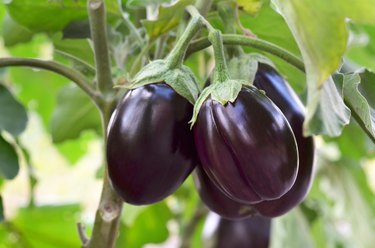
Eggplants (Solanum melongena) are a warm-weather crop that cannot be planted in the garden until your region's last frost date has passed in spring. Eggplants require 100 to 120 days to reach maturity from seed, but choosing a faster-maturing variety and establishing optimal growing conditions can bring fresh, ripe eggplants more quickly from your garden to your table.
Tip
Eggplants reach maturity from seed in 100 to 120 days, although some varieties mature faster.
Video of the Day
Growing Eggplant From Seed
Because eggplants require a relatively long time to mature and won't thrive in cool weather, if you plan to grow your eggplants from seed, you'll need to begin them indoors. Start them about eight to 10 weeks before the average last frost date for your region. Seeds need warm soil to germinate and for the seedlings to grow quickly. The ideal soil temperature for germination when starting seeds is between 70 and 90 degrees Fahrenheit, so be sure to keep your seedlings in a warm location in your home or use a heating mat to warm the soil.
Video of the Day
Growing Eggplant From Transplants
Move your transplants into the garden only after the danger of frost has passed and the soil has begun to warm. Eggplants grow optimally during daytime temperatures of 70 to 85 degrees F and can be severely damaged by even a light frost. Cool temperatures can slow growth significantly, so for the best and fastest harvest, keep your transplants indoors until the weather has warmed. If your plants begin to outgrow their containers, repot them in larger containers rather than move them outside too soon.
If purchasing transplants from a garden center, don't purchase your plants until the final frost date has passed. Choose plants with dense, compact growth. Avoid the temptation of speeding up production by purchasing plants that already have blossoms: Blossoms on seedlings may actually slow growth after transplanting and lead to fewer eggplants at harvest.
Varieties and Time to Maturity
Different cultivars of eggplant can show considerable variation in the time it takes them to reach maturity. If you want an early harvest, use care in selecting a variety. Time until harvest is usually measured from when the eggplant is transplanted into the garden, until the first fruits become ripe. Some seed packets will list the time until harvest by calculating when the seed was planted. Some varieties include:
- Matures in 50 to 55 days: Easter Egg, Millionaire
- Matures in 60 to 64 days: Calliope, Dusky, Epic, Tango
- Matures in 65 to 72 days: Black Bell, Black Magic, Casper, Fairy Tale, Ichiban, Little Fingers, Nadia, Orient Charm, Slim Jim, Snowy
- Matures in 73 to 80 days: Black Beauty, Burpee Hybrid, Classic, Ghostbuster, Rosa Bianca, Santana
You know an eggplant is ripe if you press your fingernail into its skin and it leaves an indentation.
Optimal Eggplant Growing Conditions
Given warm soil to grow in, eggplants are relatively adaptable to a range of garden conditions, but optimal conditions will improve eggplant growth and yields. Those conditions include:
- Sunlight: Eggplants require full sun.
- Soil: Eggplants grow best in well-drained soil that is relatively high in organic matter.
- Water: Once established, eggplants can tolerate dry conditions. Eggplants require at least 1 inch of water per week, especially once fruits begin to grow. Absent adequate rainfall, provide a single watering each week, moistening the soil to a depth of 6 inches.
- Fertilizer: At planting time, apply 1 1/4 pounds of 5-10-10 fertilizer per 10 feet of row. Broadcast the fertilizer and work it into the surface of the soil before planting your eggplants. When the first fruits are the size of a quarter, use 3 ounces of calcium nitrate fertilizer per 10 feet of row to side dress your plants, applying fertilizer to the soil surface under the leaves. Side dress eggplants again two weeks later, using the same amount of calcium nitrate.
Growing Eggplants in Cooler Climates
If you live in a cooler region with a shorter growing season, growing eggplants is more challenging. Covering the soil around your plants with black plastic mulch helps to raise the soil temperature and promotes rapid growth.
If a late frost strikes, cover your eggplants with hot caps or row covers to prevent damage. Hot caps are individual plant coverings made of paper or plastic that trap the warmth from the sun and speed up growth in cold climates. Row covers are made of light fabric and can raise the daytime temperature underneath the cover by as much as 10 degrees F, insulate the plants at night, and protect plants from frost and wind. Covers are spread across an entire row of plants; secure them in the ground at the sides for maximum effectiveness.
As fall approaches, begin pinching off new blossoms two to four weeks before the first expected frost date. This will speed up the ripening of existing fruit so that you can enjoy one final harvest before the frost.